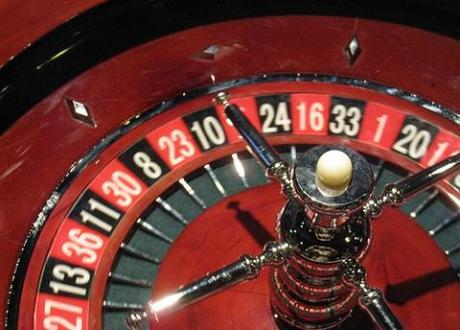
Wheel of Fortune: Gambling with our lives. Photocredit: Shimazu http://www.flickr.com/photos/shimazu/3530389945/
GamCare, a charity for gambling addicts, has advised the Government that children should be taught about the risks of gambling in the same way that they are taught about alcohol and drugs. It thinks, reported The Daily Telegraph, that there are 100,000 underage gamblers with a problem. GamCare receives £3 million in funding – from the gambling sector. Commentators see it as a potent ideological battle ground: something that can change the very fabric of society itself. It comes down to the old question – what is the function of a school? Entwined with this is the idea that if children are taught about how to control vices, they’re more likely to try them. Left and right line up once more over this highly contentious issue. These suggestions come at a time when a new “super-casino” opens at the Westfield Stratford shopping center in London. Whether the capital becomes full of distressed gamblers emptying out their pockets like Dickensian tramps remains to be seen.
“One of GamCare’s core aims is to ensure that gambling remains safe for all – and this is particularly relevant for young people,” said GamCare chief executive Andy McLellan, quoted in The Daily Telegraph.
The function of schools. Labour’s Shadow Education Secretary, Stephen Twigg, welcomed the measures, saying that what with online gambling there’s more of a need than ever for young adults and children to get informed. “It is right that, just like drug and alcohol addiction, teenagers and children are given information to prepare them for the adult world. The Government should listen to concerns,” he said, quoted on The Daily Telegraph. Graham Stuart, the chairman of the Commons Education Select Committee, however, disagreed, saying that schools should not try to cure society’s ills, but give children the “basic skills of a decent education.”
A slippery slope. It’s a “bad joke,” spluttered Melanie Phillips in The Daily Mail. Betting is always “irresponsible.” Next we’ll be teaching children about prostitution. Preparing children should be about making clear that some things are “off-limits” by their very nature. Look at sexual behavior – first we break down taboos, then worry about teenage pregnancy; we’re lax about drugs, too, and more children thake them then ever. Gambling used to be seen as a “vice”, disapproved of because of its consequences. But with the National Lottery it became “respectable.” These proposals will have the opposite effect than intended – more children will start gambling. It all smacks of ideology – Labour’s relaxed attitudes have led to schools becoming “factories for social subversion,” turning “the forbidden into the acceptable.”
It’s not children that need to be taught. Daniel Finkelstein in The Times didn’t think it was “such a great idea”, either. But GamCare should turn its attention to the Government – if they understood how to play the odds, it “might help them politically.” Scientists have studied the behavior of gamblers to see “how we respond to uncertainty.” This is easily applied to voting – when we vote, we gamble. People “anchor” their opinions, based on often arbitrary facts (such as in a “wheel of fortune” experiment, rigged to stop at 10 and 65; those who stopped on the higher number guessed higher when asked a numerical question.) In this way, voters “anchor” when thinking about the current government. Consider the Tories, who got in because they said Labour would raise taxes: Labour did the opposite, and got in because they said the Tories would slash spending. It’s contradictory – but it’s all to do with “loss aversion” and “anchoring.” It’s hard for the opposition to offer attractive changes in taxing and spending. People react differently when told there is going to be a loss – and that’s exactly what the Conservatives have done. They have to “frame the future as one in which voters think they will gain something.” Cameron still “needs a sunshine strategy.”

